If you work as an automotive mechanic, you know you are only as good as your tools. When you are stocking your toolbox, you must be certain you have every piece of equipment you need to tackle a variety of jobs. We have put together the ultimate auto mechanic tools list to help you get exactly what you need to succeed in the automotive repair industry or simply to fix your own car.
Since you probably don’t have unlimited space or budget, though, you don’t want to purchase tools you don’t need. That’s where we come in.
How We Organized Our List
We take our responsibility to give you the best possible information seriously. Therefore, in coming up with our list, we looked inside the toolboxes of automotive mechanics. Specifically, we looked at tool reviews to see what tools talented mechanics purchase most. We then organized our list into three sections: basic tools, secondary tools, and advanced tools.
While this list is comprehensive for most automotive mechanics, it may not include some specialized tools that are necessary for certain rare repairs. Still, if you use this list to stock your automotive toolbox, you will likely have just about everything you need to work on most vehicles.
The Ultimate Auto Mechanic Tools List
Basic Tools
Most automotive repair projects require some basic tools. If you are an amateur mechanic or just one who performs straightforward repairs, you can probably get by without the more advanced tools on our list. Here are the 18 basic tools that every mechanic should have.
1. Hand Cleaner
| Preview | Product | Price | |
|---|---|---|---|
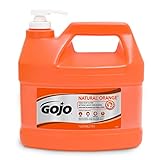
|
GOJO NATURAL ORANGE Pumice Hand Cleaner, 1 Gallon Quick Acting Lotion... |
$20.99 |
Buy on Amazon |
Your hands are your most valuable tool. Still, if your skin is covered with grease and grime, you may not trust your grip. You also may not want to hold your sandwich at lunch.
Either way, auto mechanic shops can be dirty places. With an automotive-grade hand cleaner, you don’t have to waste valuable time scrubbing your hands with regular soap. Instead, you quickly and easily remove grease and dirt. For best results, keep your tub of hand cleaner in a convenient location, where you don’t have to open doors or move things to access it.
2. Disposable Gloves

| Preview | Product | Price | |
|---|---|---|---|

|
Grease Monkey Disposable Nitrile All Purpose Gloves, Pack of 100,... |
$21.87 |
Buy on Amazon |
Automotive chemicals can wreak havoc on the health of your skin. Often, mechanics experience dry skin or rashes. More seriously, eczema and psoriasis can occur after exposure to toxic substances.
Even if you manage to avoid health consequences, you probably don’t want to walk around with stained hands in your everyday life. Having a box of disposable gloves is the solution. Before your work begins, put on a pair and use it until it requires replacement. For cleaner jobs, consider investing in a pair of high-quality, permanent gloves.
3. Shop Rags and Paper Towels
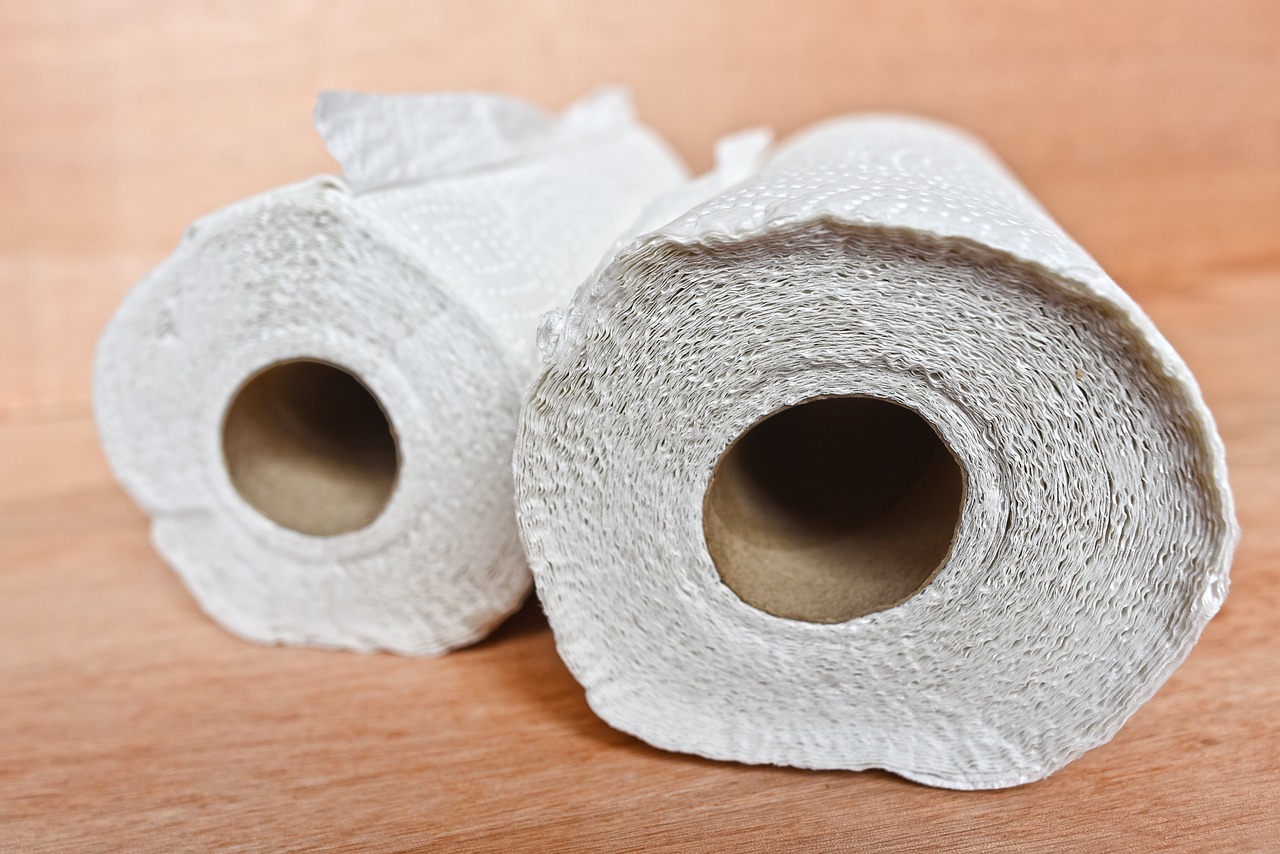
| Preview | Product | Price | |
|---|---|---|---|

|
SIMPLI-MAGIC 79006-100PK Shop Towels 14”x12”, White, 100 Count... |
$26.99 |
Buy on Amazon |
During any automotive repair project, spills happen. To ensure your workspace remains clean and safe, you must quickly clean up contaminated areas. Shop rags and paper towels are essential. Be sure you put them in a place where everyone in the garage can reach them without delay.
4. Brake Degreaser
| Preview | Product | Price | |
|---|---|---|---|

|
CRC 05084 BRAKLEEN Brake Parts Cleaner - Non-Chlorinated - 14 Wt Oz |
$9.40 |
Buy on Amazon |
Brake jobs are some of the most common automotive projects. Of course, brakes can’t function properly if they are covered in grease or brake fluid. With a can of degreaser, you have the right tool for keeping brake components in good condition.
5. Spray Lubricant
| Preview | Product | Price | |
|---|---|---|---|

|
WD-40 Original Formula, Multi-Use Product with Smart Straw Sprays 2... |
$23.00 |
Buy on Amazon |
Like brake cleaner, spray lubricant is an often-used automotive tool. Keep a can handy to loosen stuck bolts or lubricate moving parts.
6. Pliers
| Preview | Product | Price | |
|---|---|---|---|

|
GEARWRENCH 7 Pc. Mixed Plier Set, Dual Material - 82108 | Buy on Amazon |
In most trades, pliers are the wonder tool. A good set is invaluable at loosening tight bolts.
Auto mechanics also use pliers strip wires. As such, you should purchase at least a standard pair. If you have it in your budget, invest in a complete set that includes channel locks, wire strippers, and needle-nosed pliers. Note, though, that pliers vary widely in quality, with inferior ones tending to wear out or break completely. Investing in a decent set will likely save you a few headaches.
7. Set of Wrenches
| Preview | Product | Price | |
|---|---|---|---|

|
TOOLGUARDS Ratcheting Wrench Set - Unbreakable - (22 PIECES METRIC &... | Buy on Amazon |
Like pliers, wrenches are necessary for practically every automotive project. You probably need a standard and metric set. Try to purchase a strong alloy, such as chrome-vanadium, as these tend to last for years with little wear and tear. While you are it, buy an adjustable wrench for the odd occasion when a bolt or nut falls between sizes.
8. A Good Hammer
| Preview | Product | Price | |
|---|---|---|---|

|
Neiko 02870A Soft Grip Handles Fiberglass Hammer Ball Peen Set (5... | Buy on Amazon |
Hammers aren’t only for carpenters. On the contrary, automotive mechanics often need a good hammer to straighten metal, loosen a stuck part or bash the pavement in frustration. Opt for a hammer with a rubber grip to ensure you have serious leverage when you need it. Remember, for most vehicles a ball-and-peen hammer is better than a clawed one.
9. Screwdrivers
| Preview | Product | Price | |
|---|---|---|---|

|
GEARWRENCH 20 Pc. Phillips/Slotted/Torx Screwdriver Set, Dual Material... | Buy on Amazon |
Most car and truck manufacturers use screws to attach components throughout their vehicles. If you plan to repair or upgrade a car, you need some screwdrivers. Try to get a high-quality set that has a variety of sizes and shapes.
10. Hex Wrench Set
| Preview | Product | Price | |
|---|---|---|---|

|
TEKTON Hex Key Wrench Set, 30-Piece (.028-3/8 in., .7-10 mm) | 25253 |
$25.64 |
Buy on Amazon |
If the vehicle’s manufacturer didn’t use screws, there is a good chance it attached components with hex bolts. If you have a comprehensive Allen or hex wrench set on hand, you don’t have to spend valuable time running to the auto-parts store.
11. Ratchet and Socket Set
| Preview | Product | Price | |
|---|---|---|---|

|
EPAuto 45 Pieces 3/8" Drive Socket Set with 72-Tooth Pear Head Ratchet |
$39.87 |
Buy on Amazon |
Mechanics often work in tight spaces that don’t offer much room for a conventional wrench. Instead of bloodying your knuckles trying to make a wrench work, reach for your ratchet and socket set. Like wrenches, these come in standard and metric sizes. For good measure, invest in one of each before you attempt your car repair project.
12. Hydraulic Jack
| Preview | Product | Price | |
|---|---|---|---|

|
ARCAN Tools 3-Ton Quick Rise Aluminum Floor Jack with Dual Pump... |
$374.92 |
Buy on Amazon |
When you are working beneath a car, you need some extra clearance. A hydraulic jack helps you lift the vehicle and holds it in place. Even though car jacks can be expensive, they are worth the investment. When you are purchasing one, think about adding a set of vehicle ramps.
13. Multimeter
| Preview | Product | Price | |
|---|---|---|---|

|
AstroAI Digital Multimeter and Analyzer TRMS 6000 Counts Volt Meter... |
$35.99 |
Buy on Amazon |
If you are working on a car’s electrical system, you need to know which wires are live. With a multimeter, you quickly gauge voltage, amperage, and resistance. Fortunately, you don’t have to break the bank to get a good-quality multimeter, as there are several models on the market for affordable prices.
14. Funnel
| Preview | Product | Price | |
|---|---|---|---|

|
DEDC Oil Funnels, Gas Funnels, Plastic Funnel Set for Car, Automotive,... |
$11.99 |
Buy on Amazon |
Whether you are replacing engine oil, adding brake fluid or topping off windshield washer fluid, you don’t want to spill everywhere. A funnel allows you to hit the hole every time without worrying about splashes and spills. Try to purchase a filter for each type of fluid with which you work.
15. Oil Filter Wrench
| Preview | Product | Price | |
|---|---|---|---|

|
CHANNELLOCK 209 9-inch Oil Filter/PVC Pliers | Made in USA | 1.75 to... |
$17.95 |
Buy on Amazon |
Changing engine oil is the most common type of automotive project. Whether you are an amateur or a professional, you need a good oil filter wrench. This tool fits securely around the oil filter, allowing you to easily remove the old one. Since filters tend to stick, having an oil filter wrench is a virtual necessity for pulling off a stress-free oil change.
16. Oil Drip Pan
| Preview | Product | Price | |
|---|---|---|---|

|
LUMAX LX-1715 Silver 47" x 25" x 1/2" Galvanized Drip Pan Rust... |
$99.53 |
Buy on Amazon |
If you plan to change engine oil, you need an oil drip pan. This innovative piece of equipment catches used engine oil and prevents it from spilling. When you are ready to dispose of the old oil, a removable plug makes the process a breeze.
17. LED Headlamp
No products found.
Even if you only work on cars during the day, you must be able to see in dark, hidden places. Having an LED headlamp gives you the illumination you need while keeping your hands free to work. Meanwhile, the long-lived LED bulbs ensure the headlamp is always ready to go when you need it.
18. Replacement Fuses
| Preview | Product | Price | |
|---|---|---|---|

|
MulWark 120pc Assorted Standard Auto Car Truck Blade Fuses Set- 5A... |
$9.98 |
Buy on Amazon |
Often, a damaged or missing fuse is the cause of electrical problems. By stocking a variety of replacement fuses, you have exactly what you need to make a fast repair. You don’t want your extra fuse supply to sustain damage, though, so invest in a storage box. While you are purchasing fuses and a box, pick up a roll of electrical tape. This wonderful product is invaluable at splicing wires or holding harnesses together.
These 18 basic tools are essential for every amateur or professional mechanic. Whether you are new to automotive repair or simply want a well-stocked garage, investing in these tools is a good start.
Secondary Tools
While our list of essential basic tools is a good start, it is rather limited. If you want to succeed with more significant repairs, you need some additional items. Here are a few secondary-level tools that most mechanics use every day.
19. Professional-Grade Tool Chest
| Preview | Product | Price | |
|---|---|---|---|

|
Heavy-duty, Drawer 16 Tool Chest 46 In. and Rolling Cabinet Set, Red... | $2,499.95 | Buy on Amazon |
Whether you have basic, secondary, advanced or all kinds of tools, you need a secure, dry place to store them.
With a rolling tool chest, you keep your shop organized. Available in a variety of styles, colors, finishes, and prices, tool chests exist for all garage applications. Likewise, if you are worried about theft or vandalism, look for a tool chest that has a locking mechanism. If you have the budget, consider installing pegboard and other storage solutions to be certain you can always find the right tool for the job.
20. Car Creeper
| Preview | Product | Price | |
|---|---|---|---|

|
Pro-LifT C-9100 Black 40" Foldable Z Creeper (450 pounds) |
$93.36 |
Buy on Amazon |
Working beneath a car can be hard on anyone’s knees and other joints. With a car creeper, you have a comfortable place to sit or lie while you are repairing a vehicle. Available in a few styles, you pick the right one for your mechanic style. If you invest in a high-quality creeper, you can usually expect it to last for years with few problems.
21. Flexible Magnet Grabber
| Preview | Product | Price | |
|---|---|---|---|

|
VViViD Stainless Steel Flexible 2 Feet Magnetic Pick-Up Claw Grabber... |
$11.99 |
Buy on Amazon |
When you drop a screw or nut into the dark abyss of a car’s engine, you need a fast way to remove it. Since your hands are too large to fit into tiny spaces, purchase a flexible magnet grabber. These marvelous inventions snake virtually anywhere. Meanwhile, their magnetized ends quickly latch onto misplaced or dropped components. With just a bit of angling, you retrieve missing items and get back to work.
22. Molding Removers
| Preview | Product | Price | |
|---|---|---|---|

|
Drake Off Road tool 4524 11-Piece Auto Fastener & Molding Removal Tool... |
$18.92 |
Buy on Amazon |
If you have ever tried to remove a door panel or interior molding only to have clips break, you need a molding removal kit. Even though these kits are inexpensive, they serve an important purpose.
Essentially, when you use a molding remover, you preserve the interior brackets and clips that hold the molding in place. As such, when you are ready to return the molding to its original place, you don’t have to replace damaged hardware. If you want to achieve professional-grade results, you simply must invest in a molding removal kit.
23. Brake Bleeder and Vacuum Pump
| Preview | Product | Price | |
|---|---|---|---|

|
Capri Tools CP21029 Vacuum Brake Bleeder |
$75.40 |
Buy on Amazon |
Working on a vehicle’s brakes without an assistant is unbelievably frustrating. Fortunately, you don’t have to spend an entire afternoon entering and exiting the vehicle to bleed its brakes. With a brake bleeder and vacuum pump, you finish the job quickly and easily.
Even better, you can do it by yourself. As a bonus, the vacuum pump part of this tool can measure manifold vacuum.
24. Torque Wrench
| Preview | Product | Price | |
|---|---|---|---|

|
AKM TOOL 1/2-inch Drive Click Torque Wrench Set Dual-Direction... | Buy on Amazon |
When you are working on a vehicle, stripped threads are not your friend. Unfortunately, overtightening is easy to do. With a torque wrench, you tighten bolts to the manufacturer’s specifications. If you invest in a torque wrench, you never have to worry about stripped threads again.
25. Torx Wrench Set
| Preview | Product | Price | |
|---|---|---|---|

|
NEIKO 10083A Master Torx Bit Socket and External Torx Socket Set, S2... |
$54.97 |
Buy on Amazon |
Torx wrenches do the same thing as a torque wrench. They are smaller and specialized, though, so they often fit in places a regular torque wrench won’t. Purchase a top-quality set to be sure all the nuts and bolts on your projects have the right tightness.
26. Breaker Bar
| Preview | Product | Price | |
|---|---|---|---|

|
NEIKO 00258A 15” Long Impact Extension Set and Impact Socket Adapter... |
$28.17 |
Buy on Amazon |
Just as a torque wrench helps you achieve the perfect level of tightness, a breaker bar helps you loosing stuck or corroded bolts. The breaker bar is essentially a long pipe that adds leverage to your wrench or ratchet. While using a conventional pipe is an option, a breaker bar is specifically designed to encourage stuck components to budge.
27. Prybars
| Preview | Product | Price | |
|---|---|---|---|

|
REXBETI Pry Bar Set, Heavy Duty Pry Bar 4-Piece Mechanic Hand Tools,... |
$34.99 |
Buy on Amazon |
For the right amount of leverage inside of tight spaces, you can’t rely on just any tool. Instead, you need the right size of prybar from your prybar set. These tools have rubberized handles, giving you exceptional grip and control. They also have flat ends, allowing them to slide beneath components. While a larger wrecking bar may be right for heavy-duty leverage, you will likely appreciate having a set of smaller prybars in your shop.
28. Wrecking Bar
| Preview | Product | Price | |
|---|---|---|---|

|
True Temper 1173000 Gooseneck Wrecking Bar, 48-Inch | $53.28 | Buy on Amazon |
When you need some serious leverage, you sometimes can’t worry about a prybar snapping or breaking. If you purchase a wrecking bar, you don’t have to think twice before using it. Made from high-grade, solid steel, these bars give you force exactly where you need it. Even better, since wrecking bars are versatile tools, you can likely use your bar for construction, demolition or other DIY projects.
29. Repair Manuals or Software
No products found.
Working on broken vehicles requires knowing a considerable amount of information. Because all cars, trucks, and SUVs are different, you must review the vehicle’s manual before starting any repair. For this, you have a couple of options. You could locate a printed manual for every type of vehicle you service. Or, you could opt for an online or software-based alternative. Either way, if you want to be a serious mechanic, you must have access to insider information about vehicles.
30. OBD2 Scanner
| Preview | Product | Price | |
|---|---|---|---|

|
BlueDriver Bluetooth Pro OBDII Scan Tool for iPhone & Android |
$99.95 |
Buy on Amazon |
If you work on vehicles made after 1996, you need an OBD2 scanner. This device allows you to interface with the car’s onboard computer. With just a quick glance, you see which error codes the computer has triggered. Accordingly, you know where to focus your repair efforts. Note, though, that there are many different OBD2 scanners on the market today. Not all scanners are worth your time, energy or money, though. Before you purchase one, be sure you are certain it does what you need it to do.
31. Spark Tester
| Preview | Product | Price | |
|---|---|---|---|

|
Lisle 20610 Inline Spark Tester, One Size, Factory |
$12.12 |
Buy on Amazon |
Before hooking up your OBD2 scanner, you must be certain your vehicle’s engine is sparking correctly. A simple spark tester allows you to troubleshoot problems with the car’s spark plugs.
32. Drill
| Preview | Product | Price | |
|---|---|---|---|

|
DEWALT 20V Max Cordless Drill / Driver Kit, Compact, 1/2-Inch with... |
$125.14 |
Buy on Amazon |
While most of the tools on this list are hand tools, every mechanic needs a drill. If you want to avoid tripping over wires, invest in a cordless version. To save your hand from countless hours of tightening and untightening, rely on your drill to get the job done faster and more comfortably.
33. Wire Terminals
| Preview | Product | Price | |
|---|---|---|---|

|
Wirefy Heat Shrink Wire Connectors Kit - Marine Grade Electrical... |
$30.99 |
Buy on Amazon |
Just as you should have a box of new fuses, you should keep a few wire terminals on hand always. These are invaluable when you notice a wire terminal has corrosion or other damage. Try to purchase a variety of connectors, so you always have the perfect one to achieve professional-grade results with your automotive project.
34. Wire Crimpers
| Preview | Product | Price | |
|---|---|---|---|

|
Wirefy Crimping Tool For Heat Shrink Connectors - Ratcheting Wire... |
$32.99 |
Buy on Amazon |
When you need a good connection, you must attach new terminals to the ends of exposed wires. These terminals then connect to the appropriate output or source. When you attach terminals, you want a nice crimp to hold them in place. Wire crimpers are a set of pliers designed to give you a professional, crimped finish.
35. Circlip and Hose Clamp Pliers
| Preview | Product | Price | |
|---|---|---|---|

|
HFS(R) Hose Clamp Plier Set - 2Pcs - Cross Slotted & Flat Band Hose |
$14.99 |
Buy on Amazon |
While you are purchasing specialty pliers, pick up a pair of circlip pliers and hose clamp pliers. When a vehicles’ manufacturer installed different components, it probably used circlips. Circlips are tiny rings that are impossible to pull apart if you don’t have the right tool. Circlip pliers are that tool. The ends of these pliers fit easily inside of circlips, quickly pulling them apart. Meanwhile, hose clamps appear throughout the refrigeration system on most vehicles. Rather than trying to tighten hose clamps with a screwdriver, use hose clamp pliers to do the job the right way.
36. Socket Adapters
| Preview | Product | Price | |
|---|---|---|---|

|
Eagglew 5.0 Ah 21.6V Lithium Battery Replacement for V6 | Buy on Amazon |
When your ratchet is too large or too small to fit into a specific space, socket adapters save you countless hours of frustration. These tools attach to your ratchet to change its size. Without having to purchase a new socket set, you get the torque you need to finish the project.
37. Angle Grinder
| Preview | Product | Price | |
|---|---|---|---|
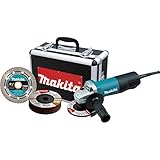
|
Makita 9557PBX1 4-1/2" Paddle Switch Cut-Off/Angle Grinder |
|
Buy on Amazon |
Working on vehicles inevitably requires cutting through metal. Because using a hacksaw takes seemingly forever and delivers subpar results, you should consider purchasing a high-quality angle grinder. These power tools quickly and professionally cut through the metal of varying thicknesses. Note, though, that grinders can be dangerous. As such, be sure you wear safety glasses and use the tool’s guard properly.
The first 37 tools on our list are necessary for anyone who wants to finish basic and secondary-level repair projects. With just these pieces of equipment, you can tackle hundreds of projects. Still, if you want to undertake more advanced work, you need a few additional items.
Advanced Tools
The following tools are for serious mechanics who never back down from tough jobs. Whether you are a passionate amateur or a professional-grade mechanic, these advanced tools are must-haves for your shop or garage.
38. Digital Calipers
No products found.
Digital calipers do the same job as conventional ones. However, because they have a digital display, these calipers are often easier to use. Meanwhile, an affordable price tag makes digital calipers the first advanced tool many mechanics purchase.
39. Mechanic’s Vise
| Preview | Product | Price | |
|---|---|---|---|

|
Yost Vises 865-D2 Reversible Combination Vise System | 6.5 Inch Jaw... | $223.99 | Buy on Amazon |
If you need to drill a perfect hole, cut a piece of metal or perform another detailed task, you need materials to stay firmly in place. A mechanic’s vice clamps tightly to objects, preventing them from shifting while you make repairs or customizations. Available in many different styles, mechanics vices are usually a positive addition to both amateur and professional garages.
40. Jump Starter
| Preview | Product | Price | |
|---|---|---|---|

|
DBPOWER Peak 1600A 18000mAh Portable Car Jump Starter (up to 7.2L Gas,... |
$72.99 |
Buy on Amazon |
Whether you are on the road or in the middle of a repair project, you need the car’s battery to work. Unfortunately, batteries can die at the most inopportune times. With a jump starter, you have the right equipment to give a dead battery a jolt, without having to call a buddy for assistance.
41. Laser Thermometer
| Preview | Product | Price | |
|---|---|---|---|

|
ennoLogic Temperature Gun (NOT for Body Temperature) - Dual Laser... |
$69.95 |
Buy on Amazon |
To diagnose refrigeration problems, a laser thermometer is a handy tool. Simply aim the thermometer at the coolant circuit and follow it, looking carefully for signs of overheating. When you find them, focus on specific components to troubleshoot the problem. If the vehicle’s air conditioning system is on the blink, a laser thermometer can also assist you with locating leaks and overheating sections.
42. Heat Gun
| Preview | Product | Price | |
|---|---|---|---|
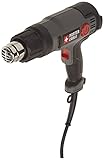
|
PORTER-CABLE Heat Gun, 1500 Watt, Dual Temperature Settings, Corded... |
$39.99 |
Buy on Amazon |
Heat guns are kind of fun to play with. They are also useful for troubleshooting problems, fixing body dents and other purposes. Since heat guns can be dangerous, however, they should only be used in accordance with the manufacturer’s specifications. Also, be sure you wear protective gear any time you fire up your heat gun or another thermal tool.
43. Air Compressor
| Preview | Product | Price | |
|---|---|---|---|

|
DEWALT Pancake Air Compressor, 6 Gallon, 165 PSI (DWFP55126) |
$159.00 |
Buy on Amazon |
Air compressors are comparatively commonplace in garages. Still, if you want to achieve success with difficult projects, you need a mechanic-grade air compressor. If you can’t afford one, buy the best generic compressor you can afford. Remember, you must also invest in a hose, so save some money for a good-quality one. Also, pick up some earplugs, as most compressors crank out some serious decibels.
44. Gauged Tire Inflator
| Preview | Product | Price | |
|---|---|---|---|

|
Astro Pneumatic Tool 3018 3.5" Digital Tire Inflator with Hose |
$75.85 |
Buy on Amazon |
The best thing you can do to preserve automotive tire life is to ensure tires have proper inflation. With a gauged tire inflator, the task is simple and precise. When purchasing one for your shop, be sure you choose an inflator that is compatible with your air compressor.
45. Impact Wrench and Sockets
| Preview | Product | Price | |
|---|---|---|---|

|
VonHaus Impact Wrench Set, 1/2-inch Drive with Hog Ring Anvil and... | Buy on Amazon |
If someone used an impact wrench to tighten lug nuts on your vehicle, you need an impact wrench to get them off. This tool leverages torque to tighten and loosen nuts. As with a tire inflator, be sure to check air compressor compatibility when purchasing your new impact wrench. Then, invest in a set of impact sockets. Since your regular socket set is not compatible with your compact wrench, you risk damaging it if you hook it up to air power. Instead, use impact sockets as the right tool for the job.
46. Brake Caliper Wind-Back Tool
| Preview | Product | Price | |
|---|---|---|---|

|
8MILELAKE Disc Brake Caliper Compressor Wind Back Tool 24pc... |
$23.99 |
Buy on Amazon |
When you are replacing pads and discs on a vehicle, the caliper may be too close for proper installation. With a brake caliper wind-back tool, you adjust the caliper to the appropriate distance. Then, simply install pads and discs for a professional-grade brake job.
47. Bearing Adapter Kit
| Preview | Product | Price | |
|---|---|---|---|

|
Orion Motor Tech Wheel Bearing Press Kit for Front Wheel Drive Bearing... |
$75.99 |
Buy on Amazon |
To successfully replace the bearings on a vehicle’s front wheels without harming the steering knuckle or strut assembly, a bearing adapter kit is a tool to have. If you use this kit, you don’t have to worry about completing an alignment after replacing bearings. Be careful, though, as this kit requires sufficient lubrication to work properly. If you aren’t familiar with how to use a bearing adapter kit, be certain your read the manufacturer’s instructions carefully.
48. Rethreading Set
| Preview | Product | Price | |
|---|---|---|---|

|
Kastar - Master Thread Chase Kit (971) | $97.58 | Buy on Amazon |
Few things are more infuriating than a stripped oil pan or plug. If you are dealing with stripped components, a rethreading set may be your best friend. These metal tools cut new threads into pans or onto plugs. They are not, however, easy to use. If you don’t have skill with rethreading, you may want to leave the project to the pros. Still, if you have a steady hand and can hold items level, using a rethreading kit may save you considerable frustration and dozens of hours.
49. Rotary Tool
| Preview | Product | Price | |
|---|---|---|---|

|
Dremel 8220-1/28 Rotary Tool with 160-Piece All-Purpose Accessory Kit | Buy on Amazon |
A handheld rotary tool has countless uses in any mechanic’s garage. Use yours for body work, small grinding, polishing or other tasks. If you are looking for a great all-around tool, investing in a rotary device is likely an excellent idea.
50. Radiator Pressure Kit
| Preview | Product | Price | |
|---|---|---|---|

|
Astro Pneumatic Tool 78585 Universal Radiator Pressure Tester & Vacuum... |
$222.99 |
Buy on Amazon |
Radiator problems can stop a vehicle in its tracks. With a radiator pressure kit, you quickly diagnose a failing coolant circuit. These kits are often specific to a vehicle’s make and model, so be certain you purchase the right kit for the types of cars you service.
51. Cylinder Compression Tester
No products found.
If you need to look for a damaged head gasket, you need specialized tools. Specifically, you must purchase a cylinder compression tester. After removing the spark plugs from the engine, plug the tool into a spark plug slot and start the vehicle’s engine. This device’s gauge indicates how much pressure is inside the cylinder. If the pressure is low when compared to the vehicle’s manufacturer specifications, a damaged head gasket is likely the culprit.
52. Cylinder Piston Rings Compression Kit
| Preview | Product | Price | |
|---|---|---|---|

|
TcJ-Chen 3" Car Engine Piston Ring Compressor Tool & Piston Ring... |
$12.85 |
Buy on Amazon |
When rebuilding an engine, you need a tool to help you place the piston and its rings inside the cylinder. The cylinder piston rings compression kit is that tool.
53. LED Bar
| Preview | Product | Price | |
|---|---|---|---|

|
NEIKO 40447A Rechargeable Cordless Underhood Work Light, 202 SMD LED... |
$80.00 |
Buy on Amazon |
When you are working under the hood or in other dark places, visibility can be limited. Instead of trying to hold a flashlight, consider purchasing an LED bar that mounts to the underside of the vehicle’s hood. With a hook or other mount, these lights allow you to use both hands to complete the project.
Because LED lights last a long time, you won’t have to worry about replacing bulbs if you purchase one of these essential tools.
54. Video Scope
| Preview | Product | Price | |
|---|---|---|---|

|
Teslong Industrial Endoscope Camera, 0.21" Waterproof Borescope... | Buy on Amazon |
When a LED bar simply doesn’t allow you to see certain areas, a video scope is an excellent alternative. These devices travel into tight places and project video images onto a screen.
For many mechanics, using video scopes is the only way to get the full picture about the inner workings of vital automotive systems. For the best results, choose a video scope that has Wi-Fi capabilities. Alternatively, opt for a scope that keeps a digital record of its findings. Either way, depending on your budget and needs, you can likely take your shop to the next level by investing in a video scope for detailed projects.
This ultimate auto mechanic tools list is comprehensive but not complete.
If you want your toolbox to have all the tools you need to work as a successful mechanic, use this list. Remember, though; some vehicles require highly specialized tools and other equipment. If you work in a shop that services one of these cars, be sure you add to this list. Nonetheless, you simply can’t go wrong by purchasing foundational tools from this list.
Featured image credit: CC0 Creative Commons, radekkulupa via pixabay.com.
Last update on 2023-04-15 at 07:41 / Affiliate links / Images from Amazon Product Advertising API

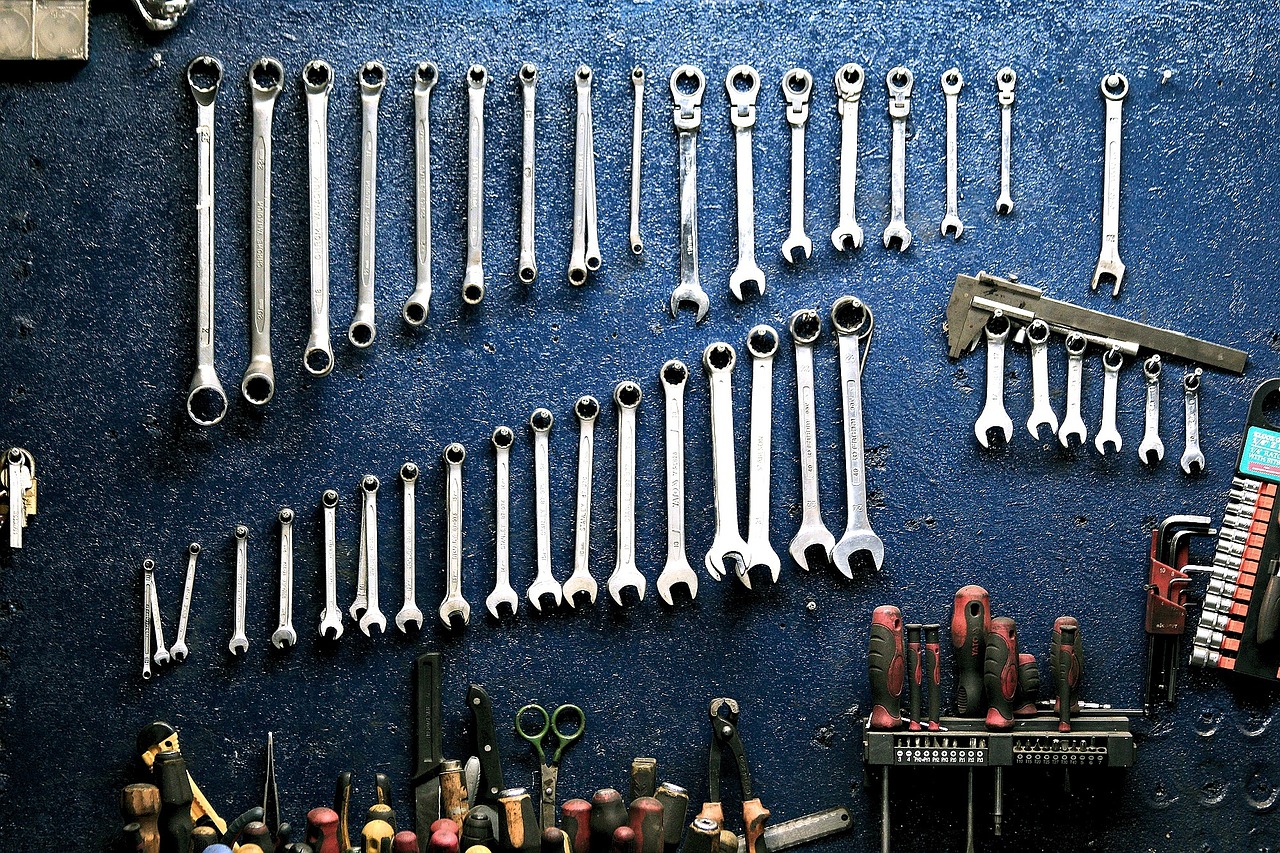
Torx bits/drivers do not limit torque
Wow! Amazing article on auto mechanic tools. Your tools list is very impressive. I like your recommendations.
Thanks!